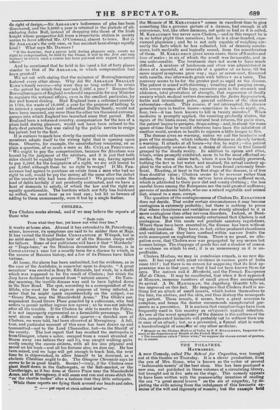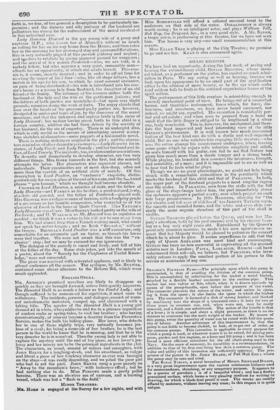THE THEATRES.
HAYMARKET.
A NEW Comedy, called The School for Coquettes, was brought out at this theatre on Thursday. It is a clever production, from the pen of Mrs. GORE, who is known as the writer of several " fashionable novels" of the best class. She has here produced a new one, not published in three volumes at a circulating library, but brought out in five acts on the stage. This comedy appears to have been written with the praiseworthy intention of reading the sex "a great moral lesson" on the sin of coquetry, by de- picting the evils arising from the indulgence of this favourite ex- ercise of the will and ingenuity of women; but the example held forth is, we fear, of too general a description to be particularly im- pressive; and the dulness and silly jealousy of the husband are palliatives too strong for the enforcement of the moral inculcated in this individual case.
Lady Honoria Howard is the gay young wife of a prosy and captious M.P.; who leaves her at Almack's without so much as calling for her on his way home from the House, and then rates her in the morning for her prolonged stay and presumed flirtations. She is very naturally piqued at this peevish jealousy and neglect ; and resolves to retaliate by giving apparent ground for suspicion ; and the arrival of her cousin Frederick—who, we are told, is a rackety fellow, but who appears a very quiet, reasonable man— affords her an opportunity, of which she avails herself. This cou- sin is, it seems, secretly married ; and in order to afford time for averting the anger of his f :ther—who, like all stage fathers, has a match in his eye for his son, to which he must consent instanter, on pain of being disinherited—his wife is introduced into his cou- sin's house as a young lely from Scotland, the daughter of an old friend of the family. The intimacy of the cousins makes both the husband of the lady and the wife of the gentleman jealous; and the fathers of both parties are scandalized—but upon very slight grounds, surmises doing the work of facts. The angry clouds that lour over the heads of the presumed guilty parties are, however, dissipated in smiles and tears of joy, by the discovery of the secret marriage, and that the unknown and orphan bride is the sister of Lady Howard; her mother having given birth to this child in a foreign county, whither she had been driven by the severity of her husband, for the sin of coquetry. There is an underplot also, which is only useful as the means of introducing several carica- ture sketches of characters—mere puppets of a fashionable novel.
There is nothing striking or originalin the plot ; and the charac- ters remind us of other dramatic personage s,—Lady Honoria. for in- stance, of Lady Tea71e and Lady rowdy ; and her husband and fa- ther, ofLordTownly. The incidents, too, awaken similar associations. To describe and dramatically to develop character, are two very different things. Mrs. GORE succeeds in the first, but she scarcely attempts the latter. Her characters also represent classes, not individuals. Their peculiarities are at most skin-deep, often not more than the varnish of an artificial state of society. Of this description is Lord Poulter, an "exclusive" exquisite, distin- guished only for an eye-glass at the end of his cane, and the haanied phrase "'poll honour," which we thought had become obsolete. COOPER as Lord Marston, a minister of state, and the father of Lady Honoria—and FARREN as his brother, a good-natured, testy, absolute old general, and the father of Frederick—played well. Mrs. GLOVER was avulgar woman of fashion, with a toadying prude of a governess as her humble companion, who reminded us of the character of Leach in the farce of Quite Correct. Miss TAYLOR'S Lady Honoria was clever. Miss SIDNEY looked pretty as the wife of Frederick ; and H. WALLACK as Mr. Howard was as repulsive as needful—we think it was a virtue in his wife not to run away from him. We had almost forgotten a French waiting-maid, who could not speak her native tongue ; and an Irish "fire-eater," without the brogue. 13111ND/1.1:s Lord Poulter was a stiff caricature, only remarkable for an automatic gait on tiptoe, as though his knees were tied together. We were not aware that this was the " ex- clusive" step ; but we may be excused for our ignorance. The dialogue of the comedy is smart and lively,. and full of hits at the follies of the day. Some stale jokes, put into the mouth of a porter, about the " Society for the Confusion of Useful Know- ledge," were not successful.
The piece was received with reiterated applause, and is likely to attract audiences all the season. The epilogue, by Mr. BULWER, contained sonic clever allusions to the Reform Bill, which were much applauded.
ENGLISH OPERA.
MR. ARNOLD'S promised novelties are likely to disappear as quickly as they are brought forward, unless their quality improves. The Haunted Hulk is as much a failure as the Feudal Lady; and though suffered to be announced for repetition, it must soon be withdrawn. The incidents, persons, and dialogue, consist of worn- out melodramatic materials, vamped up, and christened with a taking title. The spectre of the Haunted Hulk is a young girl dressed all in white, who paddles to and fro in a pinnace regardless of sunken rocks or spring-tides, to visit her brother ; who having (unintentionally, of course) become a deserter from the Preventive' Service, makes the hulk his hiding-place. Her lover, who detects her in one of these nightly trips, very naturally becomes jea- lous of a rival; for being a comrade of her brother, he is the last person in the world to know that he is missing, and that he is the very deserter he is in search of. Then the young lady is not able to explain the mystery until the end of the piece, as her lover's jea- lousy and her misery are to be the principal ingredients in the plot. The characters, as usual, consist of sailors and smugglers, with JOHN REEVE for a laughing-stock, and his sweetheart, as vulgar and literal a piece of low Cockney character as ever was brought on the stage—it was really disgusting, and we pitied the poor girl who had to act the part. JonN REEVE sung a poor parody on 4" Away to the mountain's brow," with ludicrous effect; but he had nothing else to do. Miss PINCOTT made a pretty pallid heroine. There was an abortive sea of canvass, and a burning vessel, which was but a "flash in the hold."
MINOR THEATRES.
:Ma. How is engaged at the Surrey for a few nights, and with Miss SOMERVILLE will afford a rational musical treat to the audiences on that side of the water. OSBALDISTON is always worth seeing ; he is an intelligent actor, and plays William nu, Rob Roy, the Brigand, &c., in a very good style. A Mr. Eteroer, a tragic actor, is performing at this theatre, but we have not seen him. The house is very airy—no small recommendation at this season.
Miss ELLEN TREE IS playing at the City Theatre; we promise to go and see her. KEAN is also announced again.



























 Previous page
Previous page